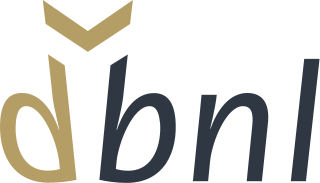Related Research Articles

The Hague is a city and municipality of the Netherlands, situated on the west coast facing the North Sea. The Hague is the capital of the province of South Holland, and the city hosts both the International Court of Justice and the International Criminal Court. The Hague is the country's administrative centre and its seat of government, and while the official capital of the Netherlands is Amsterdam, The Hague has been described as the country's de facto capital.

Leiden University Libraries is a library founded in 1575 in Leiden, Netherlands. It is regarded as a significant place in the development of European culture: it is a part of a small number of cultural centres that gave direction to the development and spread of knowledge during the Enlightenment. This was due particularly to the simultaneous presence of a unique collection of exceptional sources and scholars. Holdings include approximately 5,200,000 volumes, 1,000,000 e-books, 70,000 e-journals, 2,000 current paper journals, 60,000 Oriental and Western manuscripts, 500,000 letters, 100,000 maps, 100,000 prints, 12,000 drawings and 300,000 photographs. The library manages the largest collections worldwide on Indonesia and the Caribbean. Furthermore, Leiden University Libraries is the only heritage organization in The Netherlands with five registrations of documents in UNESCO's Memory of the World Register.
DAREnet stands for Digital Academic Repositories and is an initiative by the Dutch organisation Surf. The DARE programme is a joint initiative by the Dutch universities and the National Library of the Netherlands, the Royal Netherlands Academy of Arts and Sciences (KNAW) and the Nederlandse Organisatie voor Wetenschappelijk Onderzoek (NWO) with the aim to store the results of all Dutch research in a network of so-called repositories, thus facilitating access to them. DAREnet is now integrated into the portal Narcis.nl.

The Royal Library of the Netherlands is the national library of the Netherlands, based in The Hague, founded in 1798. The KB collects everything that is published in and concerning the Netherlands, from medieval literature to today's publications. About 7 million publications are stored in the stockrooms, including books, newspapers, magazines and maps. The KB also offers many digital services, such as the national online Library, Delpher and The Memory. Since 2015, the KB has played a coordinating role for the network of the public library. The KB's collection of websites as hosted by the former Dutch internet provider XS4ALL is on the Unesco documentary world heritage memory of the world. It is the first web collection in the world that has been granted this status.
The Dataverse is an open source web application to share, preserve, cite, explore and analyze research data. Researchers, data authors, publishers, data distributors, and affiliated institutions all receive appropriate credit via a data citation with a persistent identifier.

The Digital Library for Dutch Literature is a website about Dutch language and Dutch literature. It contains thousands of literary texts, secondary literature and additional information, like biographies, portrayals etcetera, and hyperlinks. The DBNL is an initiative by the DBNL foundation that was founded in 1999 by the Society of Dutch Literature.

The Dutch Research Council is the national research council of the Netherlands. NWO funds thousands of top researchers at universities and institutes and steers the course of Dutch science by means of subsidies and research programmes. NWO promotes quality and innovation in science. NWO is an independent administrative body under the auspices of the Dutch Ministry of Education, Culture and Science. NWO directs its approximate budget of 1 billion euros towards Dutch universities and institutes, often on a project basis. Also, NWO has its own research institutes and facilitates international cooperation. Current president of NWO since April 1, 2021 is Marcel Levi. Former NWO presidents include Stan Gielen, Peter Nijkamp and Jos Engelen.
The Biografisch Portaal is an initiative based at the Huygens Institute for Dutch History in Amsterdam, with the aim of making biographical texts of the Netherlands more accessible.
PubPsych is a vertical open access information retrieval system for psychological resources, coordinated by the research support organization Leibniz Institute for Psychology Information (ZPID). The search interface is available in English, Spanish, French, and German. PubPsych includes over 800.000 datasets and offers, where available, full-text linking, links to additional information and link resolving.

Remieg A. M. Aerts is a Dutch historian and Professor of Dutch History at University of Amsterdam.
The following is a timeline of the history of the municipality of The Hague, Netherlands,

As of 2018, Wolters Kluwer ranks as the Dutch biggest publisher of books in terms of revenue. Other notable Dutch houses include Brill and Elsevier.

Open access to scholarly communication in Germany has evolved rapidly since the early 2000s. Publishers Beilstein-Institut, Copernicus Publications, De Gruyter, Knowledge Unlatched, Leibniz Institute for Psychology Information, ScienceOpen, Springer Nature, and Universitätsverlag Göttingen belong to the international Open Access Scholarly Publishers Association.

Scholarly communication of the Netherlands published in open access form can be found by searching the National Academic Research and Collaboration Information System (NARCIS). The web portal was developed in 2004 by the Data Archiving and Networked Services of the Netherlands Organisation for Scientific Research and Royal Netherlands Academy of Arts and Sciences.
Universiteiten van Nederland (UNL), or Vereniging van Universiteiten before November 2021, is a trade group of ten government-funded universities, three special universities, and the Open University of the Netherlands. It formed as the Vereniging van Samenwerkende Nederlandse Universiteiten in 1985, as a successor to the Academische Raad.

FAIR data are data which meet principles of findability, accessibility, interoperability, and reusability (FAIR). The acronym and principles were defined in a March 2016 paper in the journal Scientific Data by a consortium of scientists and organizations.

SciPost is a non-profit foundation dedicated to developing, implementing and maintaining innovative forms of electronic scientific communication and publishing. It is notable for operating the scipost.org open-access scientific publishing portal.

Katja Loos is professor at the Zernike Institute for Advanced Materials of the University of Groningen, The Netherlands holding the chair of Macromolecular Chemistry and New Polymeric Materials.
References
- ↑ Arjan Hogenaar (2013). "National Academic Research and Collaboration Information System in the Netherlands". In Wendy Evans; David Baker (eds.). Handbook of Digital Library Economics: Operations, Collections and Services. UK: Chandos Publishing. pp. 223+. ISBN 978-1-78063-318-3 – via Google Books.
- ↑ Narcis.nl (in English and Dutch), The Hague: DANS , retrieved 10 July 2018
- ↑ "Open and closed access scholarly publications in NARCIS per year of publication", Narcis.nl, DANS, retrieved 10 July 2018
- ↑ "OA in the Netherlands". Open Access in Practice: EU Member States. OpenAIRE . Retrieved 10 July 2018.
- ↑ Marian Koren (2012). "Libraries in the Netherlands". In Ravindra N. Sharma (ed.). Libraries in the early 21st century. Vol. 2: An international perspective. De Gruyter Saur. pp. 383+. ISBN 978-3-11-029285-5 – via Google Books.